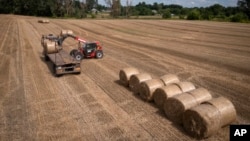Since the war broke out in Ukraine two years ago, The U.S. Agency for International Development (USAID) has marshaled more than $29 billion that has touched the lives of 17 million Ukrainians – nearly half the country’s population. This support has not only helped displaced Ukrainians and those living on the front lines survive with dignity, but has helped Ukraine build long-term strength and self-reliance.
Isobel Coleman is Deputy Administrator of USAID. She says that one of Russian President Vladimir Putin's goals in invading Ukraine was to bring the country to its knees economically. However, he has “failed spectacularly” in that goal:
“Ukraine's friends, including the United States, European allies and countries from around the world, have worked together to help keep Ukrainian farmers able to plant their fields.
“We here at USAID, we have worked with over a third of Ukrainian farmers to provide them with seeds and fertilizer, with financing, with additional storage when they couldn't immediately export their agricultural products.”
USAID has worked to bolster alternate export routes and to marshal investment to restore damaged ports in the Black Sea, said Assistant Administrator Coleman:
“We have worked with Ukrainian exporters, providing them, for example, with larger, grain railway cars so that they can bring bigger quantities of grain to the Danube ports and onto barges there. We have worked with the ports themselves to provide pilot ships that can go back and forth and bring maritime pilots from land to the ships themselves and speed up the turnaround of unloading and offloading agricultural exports in those Danube ports. We have increased investment in different border crossings to, again, speed up processing.”
The strategy is working. Today the Ukrainian economy has returned to growth. Businesses are bouncing back and international investment is returning.
USAID is committed to improving on this progress, including by supporting policy reforms:
“We're looking [at] the destruction that Putin's forces have wrought across the country to make sure that farmers have access to the energy and the irrigation that they need to be as productive as they have been in the past and even more productive going forward.”
Ukrainian agriculture provides food to some of the most vulnerable countries in the world, noted Assistant Administrator Coleman. Supporting this breadbasket is critical to feeding the world.






